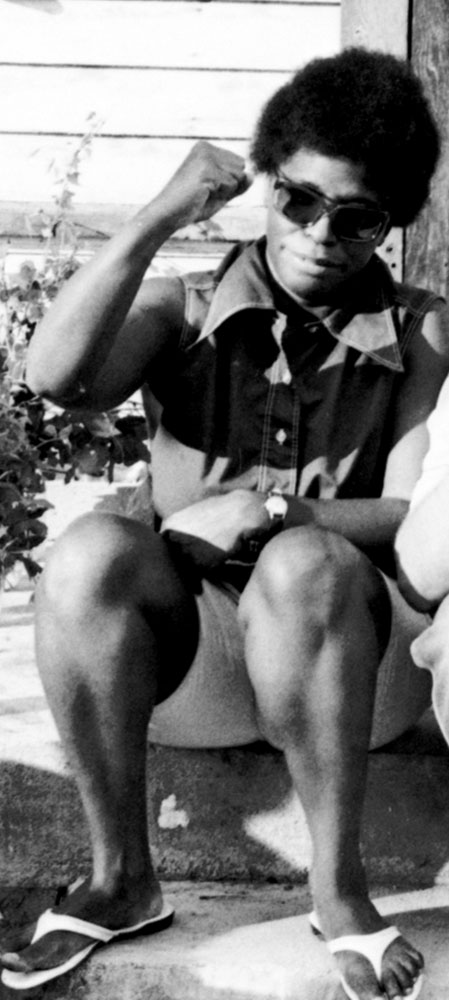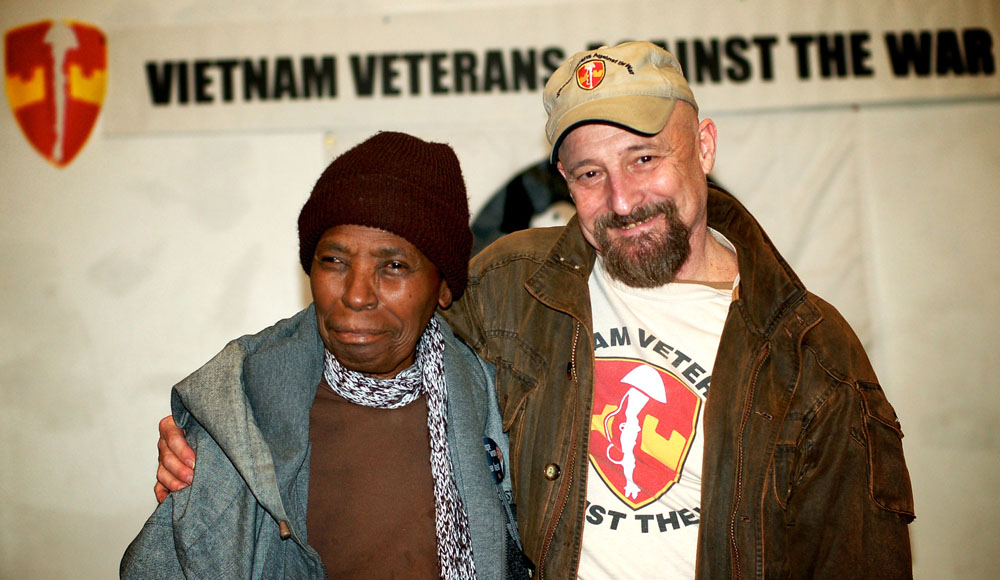 |
Remembering Chukia LawtonBy Mark HartfordIt is time once again to celebrate the life of a freedom fighter, a sister, our old friend... Chukia Lawton has died.
"Women hold up half of the sky." This sentence clarifies how important women are to the successes in our society and our world. It also describes the impact Chukia Lawton had on me, those around me and those we were fighting for the poor and oppressed people of our community. Our efforts to unite people in the defense of Gary Lawton, himself a freedom fighter who was falsely accused of killing two white policemen in his hometown of Riverside, in southern California on April 2, 1971 was my introduction to Chukia Lawton. In 1971, the San Bernardino VVAW chapter helped found the Riverside Political Prisoners Defense Committee during a meeting with Chukia and others from in and around Riverside and San Bernardino. The committee developed into a multicultural, multi-organizational planning group providing support for the legal defense and community support of Gary and the other two defendants. Riverside police officers Christian and Teel were killed by unknown assailants in an ambush at the edge of Riverside's East Side primarily Black community. Before they died they radioed for help, and within minutes an army of police besieged the black community. Heavily armed, totally disorganized and in a state of near panic, they stopped, searched and terrorized anyone who was unfortunate enough to be in the area. Some of the police in Riverside used the murders that night as an excuse to vent their panic, frustrations and racist hatred against blacks throughout the East Side. One in particular, Ronald Lund, a proven racist, used this as an opportunity to "get" Gary Lawton for these crimes. Lund's testimony was to be critical to the prosecution's case against Gary and also critical to the understanding of his racist attitudes towards people of color. The only evidence presented at the trial that proved to be truthful was Gary and Chukia's history as black "militants and trouble makers." This included their community organizing activities in 1968 to have a park named in memory of Dr. Martin Luther King after his assassination; and leadership in a citizen's police complaint council established to investigate and mediate police brutality complaints within the black community — an idea vehemently opposed by the Riverside Police Department. Gary and Chukia helped found the Black Congress, a multiracial group that dealt with problems facing communities of color. Activities of the Congress included boycotting stores that inflated prices in the black community while refusing to hire from within the community; development of safe, affordable low-income housing; a protest led by Chukia of black nurses of racist practices by the administration of a local hospital; and continued complaints about police brutality. Thirty years before Black Lives Matter, Chukia, Gary and others in their community were standing in defense of those in the African American community killed and brutalized by racist police. Gary and Chukia also organized aid for some in the community flooded out of their homes in 1969, finding them homes, furniture and provisions. By early 1971, Gary and Chukia and the Black Congress were involved in the defense of William Palmer, a black man shot in the back as he walked away from the police. The police had charged Palmer with resisting arrest. It was this history as an activist that led to Gary's arrest for the murder of these two police officers in early 1971. In the beginning Gary, Larrie Gardner, a street kid, and Nehemiah Jackson, a bible study student, were arrested and charged with two counts of murder and conspiracy (easier to prove). They were held without bail from early 1971 to their release from jail at the end of their first trial in 1973. In the first trial, all of the prosecution's witnesses except Officer Lund testified that their earlier testimony before the grand jury was false. They testified that they lied because the police had terrorized them. The trial ended in a hung jury with nine for acquittal and three for conviction. As the trial ended many on the jury hugged Gary and wished him well on the day the trial ended. These three men spent two years in jail without a right to see their friends and children. Chukia was the only person allowed to visit Gary, and only through bars that denied them physical contact. After bail was finally set, VVAW called on activists from around the country to help raise the necessary $50,000 per person, and we were able to get all three released from jail. The second trial occurred in Riverside — where the murders had taken place. Although the local media had found the three guilty the prosecutor gave up on Nehemiah Jackson, the Bible student, and sent him home, dropping the charges against him. Gary and Larrie, black militant and street kid, would be tried together. Unfortunately for the prosecution, all of their witness continued to tell the truth — Gary and Larrie had nothing to do with the murders. It ended in a hung jury with eight for guilty and four for acquittal. It was now 1974. For the first time in California's legal history, a man (Gary — Larrie had been dropped from the case, and it was back to where it had begun, an attack on a black "militant") was tried a third time for a crime of which he had never been convicted. It was now 1975. The third trial was to be held in Riverside again but because of a police shooting in the courthouse at the start of the trial, it was moved to Los Angeles. For the first time, the jury included people of color. The jury was out less than an hour and found Gary innocent of all charges. Shortly after, Gary and Chukia moved their family to northern California because of the fear the children, now in their teens, would be targeted by the racist police still in the Riverside PD.
These events have to be understood to understand Chukia Lawton. She was a person guided by great feelings of love in spite of everything happening to her and her family: Love for her community, love for the most oppressed in our society but most of all love of her family and her husband. While she was still allowed to work, Chukia took care of her job and her two children and still found time to work on the Defense Committee. She was often heard telling people she met for the first time who expressed their sympathy for her and her husband that she appreciated it but didn't need sympathy — she had an abundance of that — what she needed was hard work, money and anything else they could offer to help save the life of her husband and other political prisoners. She had little patience with those who turned away from the struggle, yet had an abundance of patience for the failings of others and always a warm smile for all of us during a sometimes very dangerous struggle. I spent most of every waking day for two years with this beautiful woman. We traveled all over California speaking to people about Gary and raising money for the defense committee to pay legal fees. She never hesitated, she never faltered. She kept her commitment to her husband long after most would have given up. Theirs was truly a love story of two amazing people committed to each other and their children. But the love story was larger than just her family. She was always ready to comfort one of us afraid to go on. Many other members of the committee were harassed, followed, stopped for no reason by the police, fired from their jobs or warned not to continue with these activities. She counseled, fought back and stood up for us through this long period of struggle. My wife spent many days and nights caring for our five year old son alone during this time because of my travels. Many people sacrificed much more. But Chukia, and after his release Gary, were always there when needed. My daughter was born in 1973. The day after her birth, Gary and Chukia turned up at the hospital to congratulate us on the birth of our daughter, kisses all around for mom, passing the baby back and forth throughout the visit. Later that night I sat in Gary and Chukia's kitchen drinking beers, celebrating the birth of the youngest member of the Defense Committee! I will always honor and remember this fearless freedom fighter and friend. She loved as well or better than anyone I have ever known. She fought harder than anyone I have ever known. She was my battle buddy. She was a friend who remembered me on Veteran's Day each year with a call to remind me how much she loved and honored me and everyone in VVAW. I was able to speak with her the day before she died. I asked her how she was feeling? She responded, "Great! How else can I feel with so many wonderful friends"? RIP sister. Mark Hartford, US Army, 1966-1969, 2nd Infantry, DMZ Korea, 1966-67, VVAW California 1971.
|



